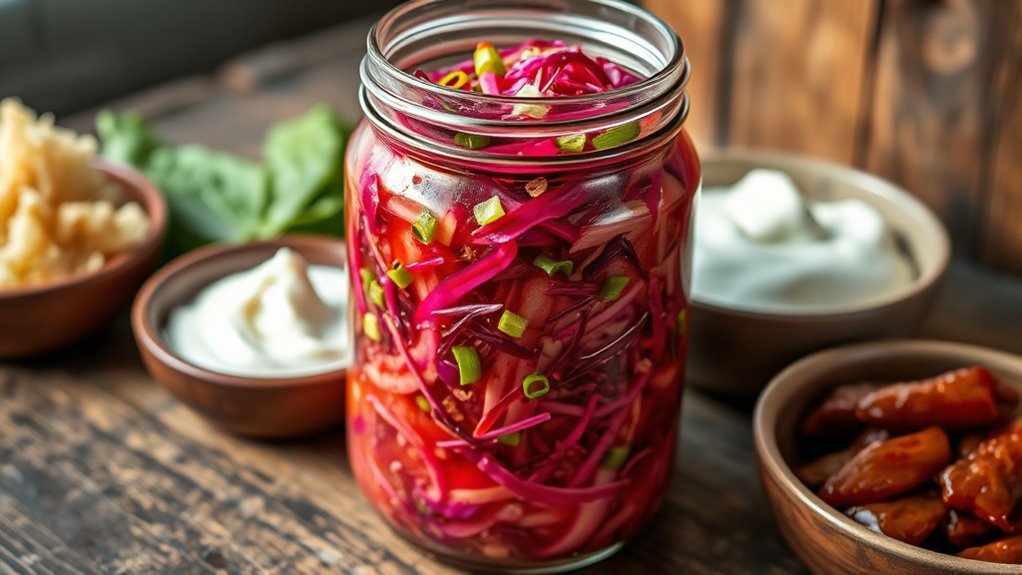Fermented foods are tasty, probiotic-rich options like yogurt, sauerkraut, kimchi, and kefir that boost your gut health. They introduce beneficial bacteria that improve digestion, support your immune system, and help maintain a healthy microbiota. Incorporating these foods regularly can enhance nutrient absorption and reduce inflammation. To enjoy their benefits safely and effectively, learn simple preparation tips and how to choose quality products. Explore these strategies further to optimize your gut health journey.
Key Takeaways
- Fermented foods contain beneficial live microbes that support gut microbial diversity and overall digestive health.
- Regular consumption of fermented foods can enhance nutrient absorption and produce health-promoting compounds like short-chain fatty acids.
- Proper preparation, sanitation, and storage are essential to ensure the safety and quality of homemade fermented foods.
- Recognizing signs of spoilage and understanding proper fermentation indicators help maintain safe, healthy options.
- Incorporating a variety of fermented foods like yogurt, kimchi, and kefir into your diet can boost immunity and digestive function.
What Are Fermented Foods and Why Are They Important?

Have you ever wondered what makes foods like yogurt, sauerkraut, or kimchi so special? These are all fermented foods, created through controlled microbial growth that transforms food components with enzymes. You need a substrate—like vegetables, dairy, grains, or meat—for fermentation to occur. Microorganisms such as bacteria, yeasts, or mold work together to produce these foods, often helping preserve them by generating antimicrobial substances. Fermentation not only extends shelf life but also enhances flavors, textures, and nutritional content. From tangy sauerkraut to creamy yogurt, fermented foods are an essential part of many cuisines worldwide. They reflect regional ingredients and microbial diversity, making them both culturally significant and delicious. Understanding the microbial processes involved can deepen your appreciation and help you experiment more confidently with fermentation at home. Additionally, the presence of beneficial probiotics in fermented foods can support gut health and boost your immune system. As fermentation techniques evolve with technological advances, exploring automation in business can lead to more efficient production methods for fermented products. Their unique qualities have made them staples across the globe for centuries. Interestingly, modern research is uncovering how specific microbial strains contribute to both flavor profiles and health benefits in fermented foods. Moreover, gaining knowledge about SQA techniques and tools can help ensure the safety and quality of fermented products during production.
How Fermented Foods Benefit Your Digestive System
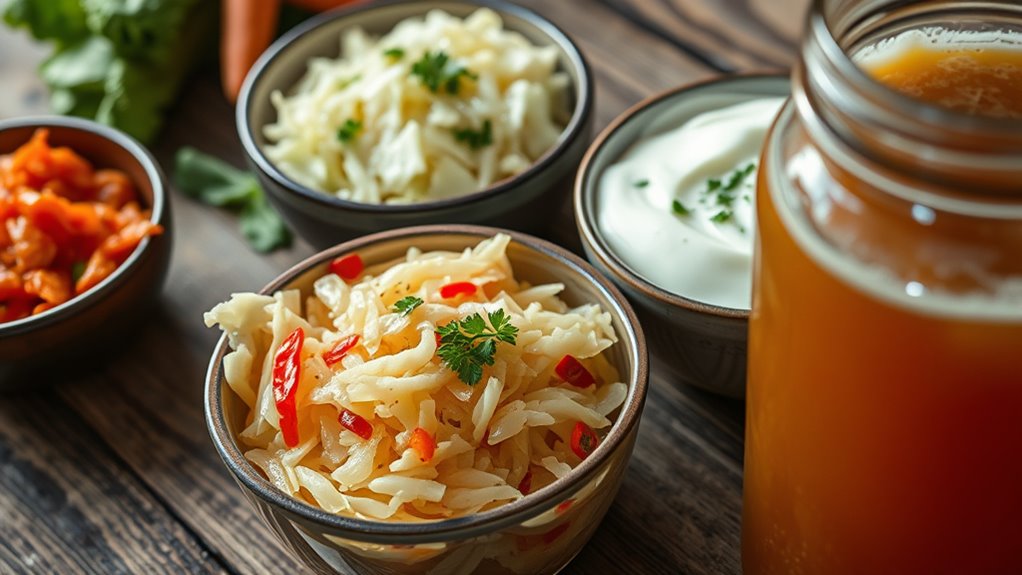
Fermented foods provide a powerful boost to your digestive system by introducing beneficial live bacteria that enhance gut microbial diversity. These probiotics help balance your gut microbiota, suppressing harmful bacteria and supporting overall digestive health. They also promote the production of short-chain fatty acids, which nourish colon cells and reduce inflammation. By reinforcing your gut barrier, fermented foods help prevent leaky gut syndrome and create a healthier intestinal environment. Regular consumption improves the resilience of your gut against pathogens and stress. Additionally, fermentation increases the bioavailability of essential nutrients like B vitamins and minerals, making digestion more efficient. Fermented foods also supply digestive enzymes that aid in breaking down lactose and complex compounds, easing discomfort such as bloating and gas.
Common Types of Fermented Foods You Can Try
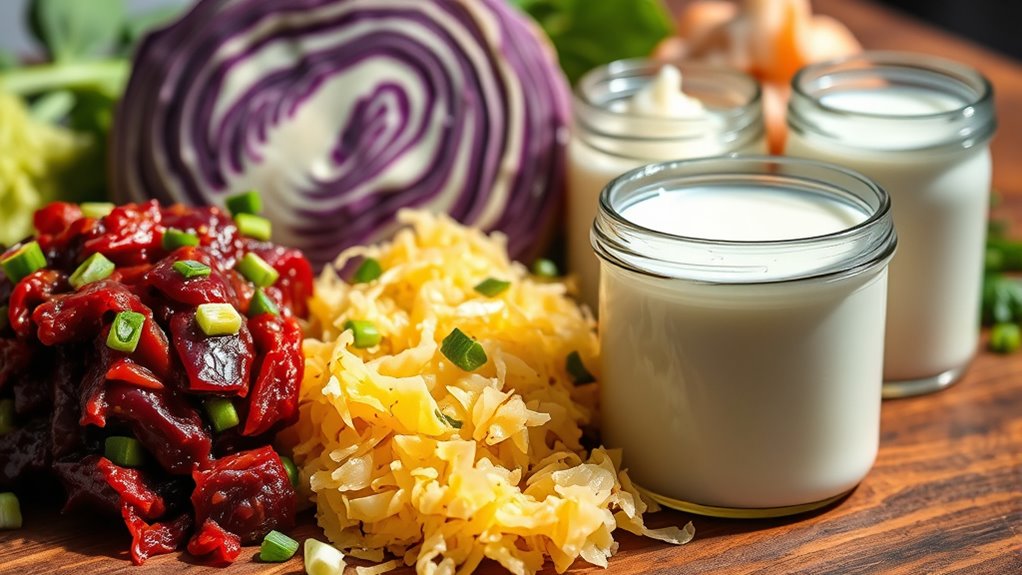
Exploring the world of fermented foods reveals a diverse array of tasty and healthful options you can incorporate into your diet. For vegetables, try kimchi, a spicy Korean fermented cabbage, or sauerkraut, a classic European fermented cabbage rich in probiotics. You can also ferment carrots, radishes, or beets at home to boost gut health and nutrient absorption. Pickles and fermented olives add flavor and probiotics to your meals. In dairy, enjoy yogurt, kefir, or aged cheeses, all containing beneficial bacteria that support digestion. For soy lovers, options like natto, tempeh, and miso provide protein, probiotics, and umami flavor. Grain-based fermented foods such as sourdough bread and traditional porridges improve digestion and nutrient uptake. These foods offer a delicious way to enhance your gut health naturally.
Simple Steps to Prepare Fermented Foods at Home

Starting your homemade fermented foods is straightforward when you gather the right equipment and ingredients. Begin by sterilizing jars—wash with warm soapy water, dry, and bake at 180°C for 15 minutes to prevent contamination. Use non-iodized salt like sea or pickling salt, avoiding table salt with additives. Select fresh vegetables, wash thoroughly, then prepare them by slicing, dicing, or leaving them whole. Dissolve salt in water to make a brine, typically using 1-3 tablespoons per 950 ml of water, or sprinkle salt directly on vegetables. Pack the vegetables loosely in the jar, ensuring they’re fully submerged under the brine or their juices. Cover with a muslin cloth secured with a rubber band to allow gases to escape, then store at 50-65°F for several days to weeks based on desired flavor. Proper fermentation conditions are essential for achieving optimal beneficial bacteria growth and ensuring safe, flavorful results. Additionally, maintaining consistent temperature and environment helps prevent spoilage and promotes successful fermentation. Proper food safety practices, such as using clean utensils and avoiding cross-contamination, are vital during fermentation.
Research Insights on the Health Effects of Fermented Foods

Research shows that consuming fermented foods can substantially boost your gut microbiome diversity, which plays a *crucial* role in supporting your immune system. A diverse microbiome helps reduce immune cell activation, lowering inflammation levels linked to chronic diseases like rheumatoid arthritis and diabetes. Fermented foods can introduce beneficial microbes that survive gastric transit, temporarily or permanently enhancing your gut’s microbial community. They also provide nutrients that promote the growth of your existing gut bacteria and strengthen your intestinal walls, improving barrier function and mucosal immunity. Additionally, fermented foods have bioactive compounds that may lower cholesterol, blood pressure, and markers of inflammation. These effects support overall metabolic health and may help prevent certain cancers. The broad consistency of immune benefits across individuals highlights their potential as a *vital* part of your diet. Incorporating fermented foods into your diet can further enhance these beneficial effects by supporting a healthy, diverse gut microbiome.
Tips for Adding Fermented Foods to Your Daily Meals
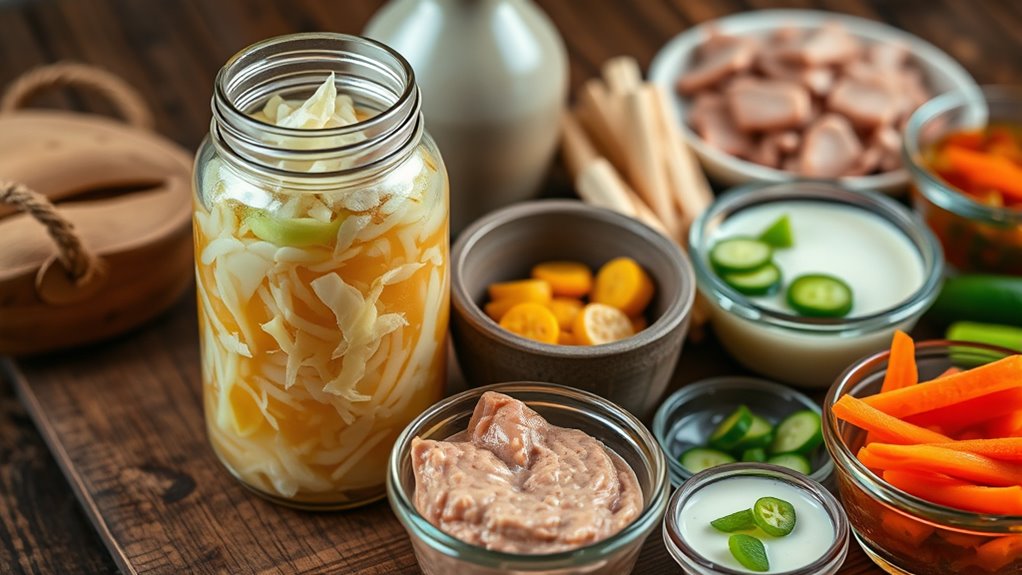
Incorporating fermented foods into your daily meals is easier than you might think, and small adjustments can make a big difference for your gut health. Start by adding yogurt to sauces or using it as a marinade for meats and vegetables. Include sauerkraut in sandwiches to boost flavor and probiotics, or toss kimchi into stews for added crunch. Swap out traditional proteins with tempeh in stir-fries, or stir miso paste into soups for umami richness. For breakfast, pair eggs with sauerkraut or blend fermented foods like kefir or kimchi into smoothies. You can also add fermented vegetables to tacos or enjoy pickles as sides. Begin with small portions, choose familiar dishes, and gradually increase your intake to help your gut adapt comfortably. Emphasizing the importance of cultural impact can inspire you to explore diverse fermented foods from around the world to enrich your diet. Additionally, considering space and organization in your kitchen can help you better store and access your fermented ingredients, making it easier to incorporate them into your meals. Incorporating nutrient-rich ingredients can further enhance the health benefits of your fermented food choices. Moreover, paying attention to fermentation techniques can improve the flavor and safety of your homemade ferments.
Recognizing Safe and Quality Fermented Products

To guarantee you’re selecting safe and high-quality fermented products, it’s essential to recognize key indicators that reflect proper fermentation and safety standards. Look for consistent taste, aroma, and texture typical of the specific fermented food. A pleasant, tangy smell usually indicates good acid production; foul odors suggest spoilage or contamination. Check packaging for integrity—no swelling or leaks—to prevent contamination and preserve microbial balance. Visible mold (besides expected surface yeasts or cultures) or unusual discoloration signals potential safety issues. Ensure labels include fermentation time, ingredients, and storage instructions, which support quality. Be cautious with products from untrusted sources or those lacking certifications. Properly fermented products follow strict sanitation, temperature control, and safety protocols, reducing risks and ensuring a healthy, safe eating experience. Additionally, understanding the signs of spoilage can help you avoid consuming unsafe fermented foods. Monitoring storage conditions is also crucial, as improper storage can compromise fermentation quality and safety. Staying informed about Vetted – Flat Iron Bike standards can serve as a reminder to choose products from reputable sources committed to safety and quality. Recognizing proper fermentation indicators can further ensure you’re selecting foods that are both safe and delicious. Being aware of industry safety standards can also help you make better choices when selecting fermented products.
Making Fermented Foods Part of a Balanced Diet
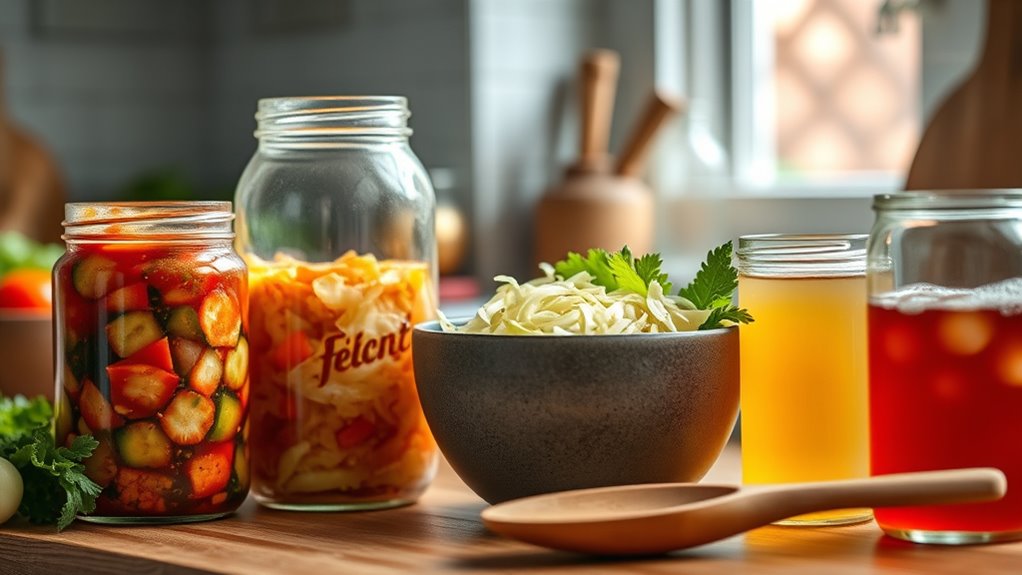
Adding fermented foods to your daily meals can be an easy and delicious way to boost your health. Start small by including yogurt, kefir, or cheese, which are familiar and mild. Incorporate kimchi or sauerkraut as side dishes for extra probiotics, or add miso and tempeh to soups and stir-fries for flavor and nutrition. Drinking kombucha is an easy way to increase probiotic intake, while fermented vegetables or brine drinks diversify your gut bacteria. To make it sustainable, explore different types of fermented foods regularly, and incorporate them into your meals rather than relying solely on supplements. Keep a steady supply in your kitchen, and get creative with recipes online. Over time, these habits can improve digestion, strengthen immunity, and support overall gut health. Including beneficial ingredients like collagen and hyaluronic acid found in some fermented products can also contribute to overall health. Additionally, choosing fermented foods that are rich in probiotics can further enhance your gut flora and promote better digestion. Incorporating Glycolic Acid from skincare routines may also help improve skin texture, complementing your overall wellness journey. Being mindful of gut health can also positively influence your mood and energy levels, making this a holistic approach to well-being.
Frequently Asked Questions
Are Fermented Foods Suitable for People With Food Allergies or Sensitivities?
You might wonder if fermented foods suit those with food allergies or sensitivities. While they can help reduce allergenic proteins and support gut health, they aren’t suitable for everyone. If you’re sensitive to histamine or have immune issues, consuming fermented foods could cause reactions like headaches, stomach upset, or allergies. Always listen to your body and consult a healthcare professional before adding fermented foods to your diet if you have concerns.
Can Children or Pregnant Women Safely Consume Fermented Foods Regularly?
You’re wondering if children or pregnant women can safely enjoy fermented foods regularly. Generally, with proper choices and moderation, they can benefit from the nutrients and gut health support fermented foods offer. For children, start with small amounts of pasteurized options like yogurt or kefir. Pregnant women should avoid unpasteurized products and consult healthcare providers. Keep an eye on reactions and focus on safe, well-made fermented foods for ideal safety.
How Long Do Fermented Foods Typically Last Before They Spoil?
Did you know fermented foods can last from several weeks to a year? You can store brine-fermented vegetables for up to a year in a cool, dark spot, while kimchi often stays good for about a year if kept properly. To keep them fresh longer, always store in airtight containers, submerged in brine, and keep them in the fridge. Watch for signs of spoilage like mold or off smells.
Do All Fermented Foods Contain Live Beneficial Probiotics?
You might wonder if all fermented foods contain live beneficial probiotics. The truth is, not every fermented food does. While some, like yogurt and kefir, usually have live probiotics if labeled correctly, others like beer or cooked sauerkraut often lose their beneficial microbes during processing. Always check labels for specific strains and live culture indications to guarantee you’re getting probiotic benefits from your fermented foods.
Are There Any Risks or Side Effects Associated With Eating Fermented Foods?
You might wonder if eating fermented foods has any risks. Yes, they can harbor harmful microbes if contaminated during production or storage. Some people experience digestive issues like gas, bloating, or diarrhea, especially when starting out or over-consuming. Those with allergies, histamine intolerance, or weakened immune systems face higher risks of adverse reactions or infections. Always handle and consume fermented foods properly, and consult a healthcare provider if you have specific health concerns.
Conclusion
So, now that you’re practically a fermented food aficionado, go ahead—dive into kimchi, kefir, or sauerkraut and give your gut the party it deserves. Who knew that a little fermentation could turn your digestion into a well-oiled machine? Just remember, if your stomach starts doing the samba, maybe tone it down. Embrace the tang, enjoy the benefits, and become the fermented food hero your gut secretly craves. Cheers to a healthier, happier belly!
